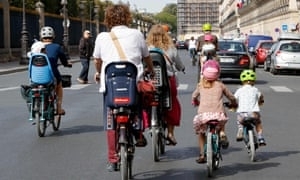New petrol and diesel car sales in Europe must be phased out before 2030 if the auto sector is to play its part in holding global warming to the Paris agreement’s 1.5C goal, a new analysis has found.
Forecourt plug-in hybrids will also have to disappear by 2035 at the latest, according to analysis by the German Aerospace Centre (DLR), commissioned by Greenpeace.
Vehicle emissions have barely changed over the last decade and the industry will exhaust its carbon budget within five to 10 years unless there is a radical shift, the DLR scientists say.
“Auto CO2-emissions need to peak as soon as possible,” Prof Horst Friedrich, DLR’s director, told the Guardian. “Looking at the dwindling carbon budget it is crucial to push low-emitting cars into the market, the earlier the better, to renew the fleet.”
The study warns that “stark measures” would be needed to do this with a 66% chance of meeting the 1.5C goal – including a drop in conventional car sales from around 15m this year to 5m in 2022.
Under this scenario, the last vehicle with an internal combustion engine would be sold in 2028 and diesel and petrol powered-cars would be banished from the roads by the mid-2040s.
Behavioural change towards walking, cycling and public transport would also be necessary.
“It would be much easier to keep a 2C target because there is a higher carbon budget and therefore more time to implement the necessary measures,” Friedrich said. “I estimate it could provide us with up to 10 years more time to prepare much better for the fundamental transformations necessary.”
A draft report by the UN Intergovernmental Panel on Climate Change makes clear that 2C of warming would expose around 10 million more people in coastal areas to floods, storm surges and crop damage than 1.5C would. Global sea levels would also rise by an extra 10cm, heatwaves would be longer, extreme weather events stronger, economic growth lower, while crop yields and water availability would substantially decline.
So far, the European commission has proposed a 30% cut in vehicle emissions by 2030, although MEPs are pushing to raise that figure to 45%.
The UK government has announced that sales of all new petrol and diesel vehicles will be banned by 2040, while some countries including Germany, Ireland, India and the Netherlands have set a more ambitious deadline of 2030.
Energy utilities have often led calls for greater ambition and Kristian Ruby, the secretary general of Eurelectric, the power sector trade association, said that the current EU proposal was “not in line with the Paris objectives”.
He told the Guardian: “The timeline of a full phase out by 2030 does sound quite ambitious. Car makers are only ramping up now for around 20 new electric models that will come to market next year. But this needs to happen, and faster than currently seen by the European commission. There is no doubt about that.”
Some analysts also believe that Europe’s car manufacturers have made no real-world improvement in auto CO2 emissions for five years, because of the “gaming” of emissions tests.
A spokesperson for the European Automobile Manufacturers Association said: “It is still hard to predict whether the alternative powertrains will have gained a significantly high market share by 2030. This is dependent on factors that are outside the control of automobile manufacturers, such as the necessary recharging infrastructure being in place as well appropriate incentives.”
More about: #Climate-Change
















































